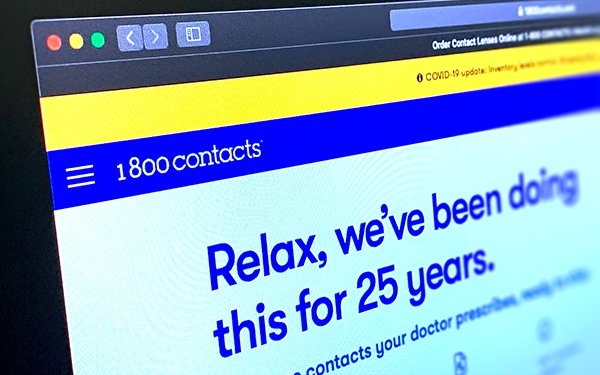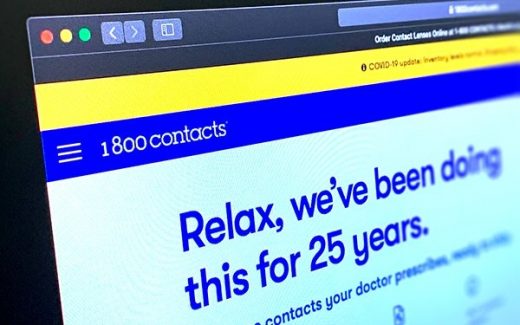1-800 Contacts Sues Warby Parker Over Search Advertising
1-800 Contacts Sues Warby Parker Over Search Advertising

The contact lens retailer 1-800 Contacts has brought a trademark infringement lawsuit against competing eyewear company Warby Parker over its alleged use of the term “1-800 Contacts” to trigger paid-search ads.
“Instead of independently developing its own brand awareness related to the online sales of contacts, Warby Parker has devised a plan to confuse and mislead consumers who seek to go to 1-800 Contacts’ online store,” 1-800 Contacts alleges in the new complaint, filed Tuesday in U.S. District Court for the Southern District of New York. “Warby Parker’s plan is designed in purpose and effect to trade off 1-800 Contacts’ brand name and reputation through unauthorized bidding on 1-800 Contacts’ trademarks as search engine keywords that generate Warby Parker advertisements.”
1-800 Contacts adds that search-engine users who click on Warby Parker’s ads are taken to a page that has similar elements to the 1-800 Contacts’ website.
“When consumers familiar with the 1-800 Contacts website — 1800contacts.com — arrive at the Warby Parker webpage linked to Warby Parker’s deceptive ad, they see a familiar light blue colored background displaying representative contact lens products and a discount offer, just like that found at 1800contacts.com, such that they are falsely assured that they have reached the 1-800 Contacts website or one that is affiliated with 1-800 Contacts,” the complaint alleges.
1-800 Contacts has a long history of bringing — and settling — similar cases. Those settlements, which involved agreements to limit search ads, led to a protracted dispute with the Federal Trade Commission.
That dispute recently resulted in an appellate court ruling in favor of 1-800 Contacts.
Between 2004 and 2013, the company sued or threatened to sue at least 14 competitors for alleged trademark infringement, arguing that its trademark was violated when rivals used the phrase “1-800 Contacts” to trigger a paid-search ad.
Thirteen of the competitors settled with 1-800 Contacts by agreeing to restrict the use of its trademark in search advertising. (Only Lens.com fought the lawsuit, which ended in a ruling largely in Lens.com’s favor.)
Five years ago, the Federal Trade Commission alleged in an administrative complaint against 1-800 Contacts that those settlement agreements violated antitrust law.
An administrative judge found in the FTC’s favor. The contact lens retailer appealed that ruling to the FTC, which concluded 4-1 that 1-800 Contacts acted anticompetitively.
Former Chairman Joe Simons wrote in the majority opinion that the settlement agreements may have deprived consumers of the ability to compare brands.
“When an agreement limits truthful price advertising on the basis of trademark protection, it must be narrowly tailored to protecting the asserted trademark right,” Simons wrote. “The agreements here are not — they restrict advertising regardless of whether the ads are likely to be confusing.”
1-800 Contacts then appealed to the 2nd Circuit Court of Appeals, arguing that the settlements were valid, and that the FTC’s theories would undermine trademark policy and companies’ investments in their brand names.
The company also said its settlement agreements did not prevent consumers from learning about other sellers.
In June, a two-judge panel of the 2nd Circuit found in favor of 1-800 Contacts. Those judges wrote that even though trademark agreements “limit competitors from competing as effectively as they otherwise might,” courts “owe significant deference to arm’s length use agreements negotiated by parties to those agreements.”
Those judges also noted that questions surrounding the use of trademarks in search advertising haven’t been definitively resolved.
“At the time the agreements were entered into, the law regarding the validity of petitioner’s trademark claims was unsettled, and it remains so in this Circuit,” the judges wrote. “The fact that the law was unsettled at the time is one reason a party might enter into a settlement agreement.”
The FTC recently petitioned the 2nd Circuit to reconsider that ruling. The agency’s petition is still pending.
Judges across the country have struggled with questions involving trademarks in search ads for more than a decade.
Google has prevailed in several lawsuits alleging that they wrongly allowed a trademarked term to trigger pay-per-click ads, as have several advertisers. But judges have allowed several other lawsuits between advertisers to proceed to jury trials.
Soon after the FTC initially sued 1-800 Contacts, the company — along with the competitors that entered into the restrictive search ad agreements — were sued by consumers in federal court in Utah.
All of those companies agreed to settle that matter for $40 million, with 1-800 Contacts agreeing to pay $15 million of that figure.
(23)


